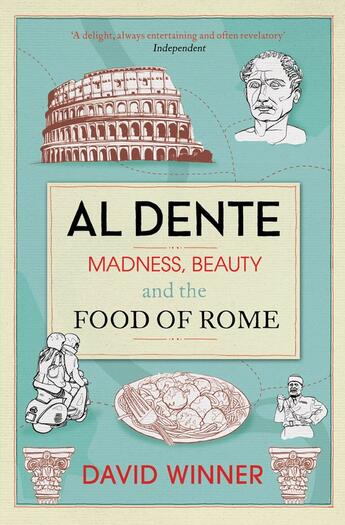Des idées de lecture pour ce début d'année !
Passionné(e) de lecture ? Inscrivez-vous
gratuitement ou connectez-vous pour rejoindre la
communauté et bénéficier de toutes les fonctionnalités du site !

Imagine the River Tiber as an alimentary tract. Picture a hungry saint. Think of erotic Renaissance fruit paintings, transubstantiation and a tiramisu café where magic is surely on the menu... This highly original interpretation of Rome's history, culture, art and religion takes the form of a book about food that's not really about food at all. During his first two years in Rome, David Winner found himself in turn amazed and overwhelmed by its physical, historical and cultural vastness. Then a chance encounter with an extraordinary pudding provided him with the means to start digesting his surroundings. That evening he was struck by the significance of the Roman attitude to food: a unique and unequivocal relationship between sustenance and existence, where every last aspect of life is (and always has been) 'pickled in alimentation'. In Al Dente Winner takes us on a stroll through the city as he muses idiosyncratically on all things comestible and much else besides. Here we learn about Rome as metropolis and necropolis, about tasty vineyard snails and the food-and-sex scandal that sent Saint Jerome packing. The cinematic greats such as Argento, Fellini and Ferreri are discussed alongside historical political satire where grocery orgies were art and the penis was the subject of hagiographies. There are the bloodthirsty antics of an eighteenth-century executioner who worked for the pope, stories of immolation, architecture and artichokes, and a telephone interview with a nun who makes Eucharistic wafers. There's also a nice 1891 recipe for stewed lamb's head. Winner is a master of wit and diversity with a seemingly insatiable appetite for peculiar detail and disturbances on the cultural landscape. In Eat, Don't Eat his ability to explore the world around him as a series of interconnections provides an intriguing new portrait of a remarkable city - a veritable trifle of Roman bedrock and apogee, cosmos and counterculture to be devoured with gusto. Buon appetito...
Il n'y a pas encore de discussion sur ce livre
Soyez le premier à en lancer une !

Des idées de lecture pour ce début d'année !

Si certaines sont impressionnantes et effrayantes, d'autres sont drôles et rassurantes !

A gagner : la BD jeunesse adaptée du classique de Mary Shelley !

Caraïbes, 1492. "Ce sont ceux qui ont posé le pied sur ces terres qui ont amené la barbarie, la torture, la cruauté, la destruction des lieux, la mort..."